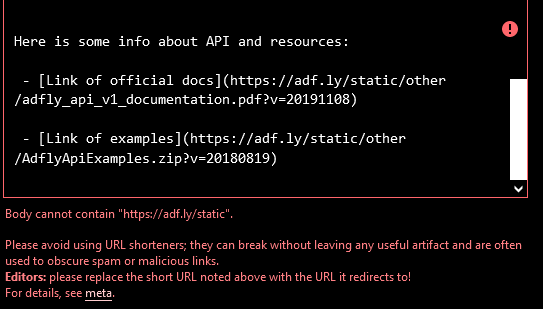I tried to edit a question which used a roundabout way to refer to documentation it was working with. I formatted them as proper links however, I quickly found out why the user chose a roundabout way to present them. With proper links there is a message:
Body cannot contain "https://adf.ly/static".
Please avoid using URL shorteners; they can break without leaving any useful artifact and are often used to obscure spam or malicious links.
Editors: please replace the short URL noted above with the URL it redirects to!
For details, see meta.
This is the text in the body which throws a problem:
- [Link of official docs](https://adf.ly/static/other/adfly_api_v1_documentation.pdf?v=20191108)
- [Link of examples](https://adf.ly/static/other/AdflyApiExamples.zip?v=20180819)
Both of these links are not shortened. There is nothing to expand - this is the link to the documentation for the API. And the question is directly related. Not much different to saying "I use X from Y" and linking to the API documentation for Y.
I ended up using this:
- Link of official docs: `https://adf.ly/` + `/static/other/adfly_api_v1_documentation.pdf?v=20191108`
- Link of examples: `https://adf.ly/` + `static/other/AdflyApiExamples.zip?v=20180819`
How can such links be usefully displayed within a post? Having to partially obscure them makes it seem there is something shady happening when it is actually relevant information.

adf.ly/staticURL-looking string in the body of the post and triggers the block. Hence...the hack.